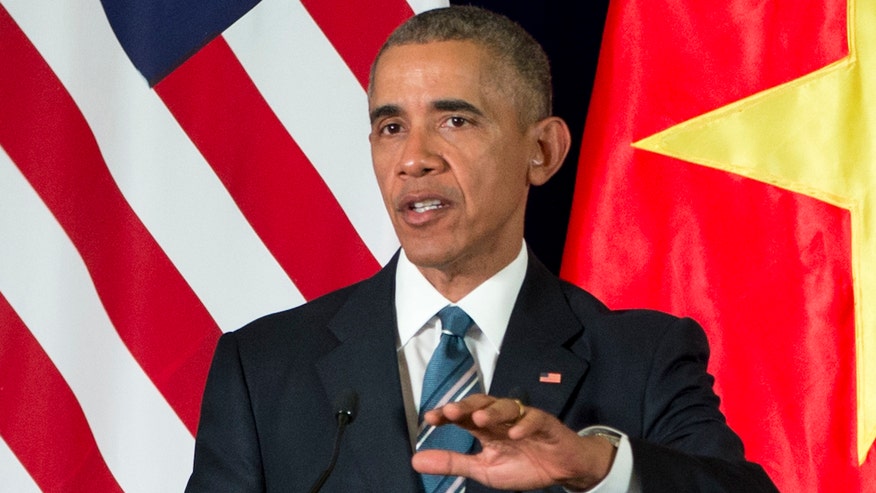President Obama lifted the decades-long U.S. arms embargo against Vietnam on Monday in an apparent effort to shore up the communist country’s defenses against an increasingly aggressive China – though he faced criticism that the move takes away U.S. leverage to press for human rights freedoms. 
Obama announced the full removal of the embargo at a news conference in Hanoi alongside Vietnamese President Tran Dai Quang. The president said the move was intended as a step toward normalizing relations with the former enemy and to eliminate a “lingering vestige of the Cold War.”
The embargo was imposed in 1984. The United States partially lifted the ban in 2014, but Vietnam pushed for full access as it tries to deal with China’s land reclamation and military construction in nearby seas.
Obama, in announcing the agreement Monday, said every U.S. arms sale would be reviewed on a case-by-case basis going forward. Vietnam has not bought anything, but removing the remaining restrictions shows relations are fully normalized and opens the way to deeper security cooperation.
“At this stage both sides have developed a level of trust and cooperation, including between our militaries, that is reflective of common interests and mutual respect,” Obama said.
U.S. lawmakers and activists, though, had urged Obama to press for greater human rights freedoms in the one-party state before lifting the embargo. Vietnam holds about 100 political prisoners and there have been more detentions this year.
“In one fell swoop, President Obama has jettisoned what remained of U.S. leverage to improve human rights in Vietnam — and (has) basically gotten nothing for it,” Phil Robertson, with Human Rights Watch, said.
In Beijing, China’s Foreign Ministry outwardly praised the move, with a spokeswoman saying China hoped “normal and friendly” relations between the U.S. and Vietnam would be conducive to regional stability. China itself remains under a weapons embargo imposed by the U.S. and European Union following 1989’s bloody military crackdown on pro-democracy demonstrations centered on Beijing’s Tiananmen Square.
Obama said the United States and Vietnam had mutual concerns about maritime issues and the importance of maintaining freedom of navigation in the South China Sea. He said that although Washington doesn’t take sides on the territorial disputes, it does support a diplomatic resolution based on “international norms” and “not based on who’s the bigger party and can throw around their weight a little bit more,” a reference to China.
Lifting the arms embargo will be a psychological boost for Vietnam’s leaders as they look to counter an increasingly aggressive China, but there may not be a big jump in sales.
Obama was greeted Monday by Quang at the Presidential Palace, where Obama congratulated Vietnam for making “extraordinary progress.” Quang praised the expansion in security and trade ties between “former enemies turned friends” and called for more U.S. investment in Vietnam.
Obama also made the case for stronger commercial and economic ties, including approval of the 12-nation Trans-Pacific Partnership trade agreement that is stalled in Congress and facing strong opposition from the 2016 presidential candidates. The deal, which includes Vietnam, would tear down trade barriers and encourage investment between the countries that signed it.
Critics worry it would cost jobs by exposing American workers to low-wage competition from countries such as Vietnam.
Obama and Quang earlier attended a signing ceremony touting a series of new commercial deals between U.S. and Vietnamese companies valued at more than $16 billion. The deals included U.S. engine manufacturer Pratt & Whitney’s plans to sell 135 advanced engines to Vietnamese air carrier Vietjet, and Boeing’s plans to sell 100 aircraft to the airline.
Obama is the third sitting president to visit Vietnam since the end of the Vietnam War in 1975. Four decades after the fall of Saigon, now called Ho Chi Minh City, and two decades after President Bill Clinton restored relations with the nation, Obama is eager to upgrade relations with an emerging power whose rapidly expanding middle class beckons as a promising market for U.S. goods and an offset to China’s growing strength.
The United States is eager to boost trade with a fast-growing middle class in Vietnam that is expected to double by 2020. That would mean knocking down auto, food and machine tariffs to get more U.S. products into Vietnam.































